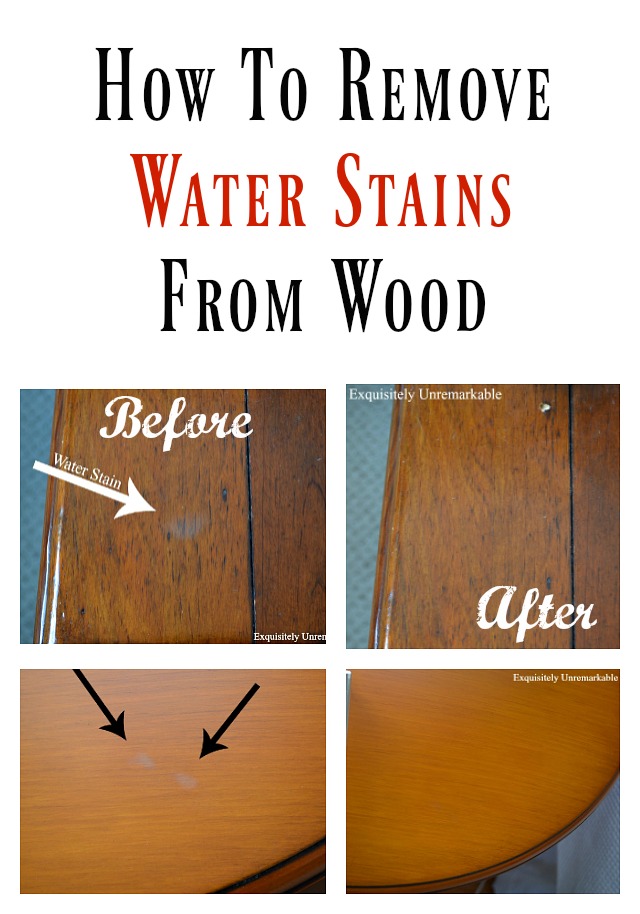Vanishing Watermarks: The Ultimate Guide to Pristine Wood
That dreaded white ring on your antique table? The cloudy blemish on your polished wood floor? Water spots. They’re the bane of beautiful wood, a silent testament to a misplaced glass or a spilled drink. But before you despair, know this: banishing these watery ghosts is often easier than you think. This guide dives deep into the art of water spot removal, offering solutions for every type of wood and every level of damage.
Water spots form when moisture penetrates the wood’s finish, becoming trapped beneath the surface. This trapped moisture causes the wood fibers to swell, creating a hazy or white mark. These marks can range from barely noticeable to glaringly obvious, depending on the type of wood, the finish, and the amount of moisture involved.
For centuries, people have cherished wooden furniture and structures, striving to maintain their beauty and integrity. Historically, removing water spots involved techniques like rubbing with ashes or using natural oils. The modern era introduces us to a broader arsenal of methods, from simple home remedies to specialized cleaning products. The importance of understanding water spot removal lies in preserving the longevity and aesthetic appeal of our wooden possessions.
One of the main issues with eliminating water stains is identifying the type of spot. A white, hazy mark typically indicates a surface blemish, easily addressed with gentle methods. A darker, more ingrained stain, however, may signify deeper damage requiring more intensive treatment. Misdiagnosing the spot can lead to ineffective treatment or even further damage to the wood.
Water spot removal, in its simplest form, involves drawing the trapped moisture out of the wood and restoring the finish’s clarity. This can be achieved through various methods, from the application of heat and absorbent materials to the use of mild abrasives and specialized cleaning solutions. A simple example involves gently rubbing the spot with a mayonnaise-soaked cloth, allowing the oils to displace the trapped moisture.
Restoring wood to its former glory comes with several advantages. First, it enhances the aesthetic appeal of your furniture and surfaces. Second, it protects the wood from further damage by sealing the surface against moisture penetration. Finally, it preserves the value of antique or valuable pieces, maintaining their integrity and desirability.
Creating an action plan for water spot removal involves assessing the damage, gathering necessary materials, and selecting the appropriate method. Begin by determining the severity and type of water spot. Then, assemble materials like soft cloths, mayonnaise, toothpaste, or specialized wood cleaners. Finally, choose a method based on the spot’s characteristics and the type of wood.
Step-by-step guide for removing surface water spots:
1. Gently rub the spot with a soft, dry cloth.
2. If the spot persists, try mayonnaise on a soft cloth, leaving it for a few hours before buffing.
3. For stubborn marks, consider a non-gel toothpaste mixed with baking soda, applied gently in a circular motion.
Recommendations: Consult reputable woodworking websites or books for detailed instructions and product recommendations.
Advantages and Disadvantages of Different Methods
| Method | Advantages | Disadvantages |
|---|---|---|
| Mayonnaise | Gentle, readily available | Can leave a residue if not buffed properly |
| Toothpaste/Baking Soda | Mildly abrasive, effective on stubborn spots | Can scratch delicate finishes if used excessively |
Best Practices: Always test any method on an inconspicuous area first. Use soft cloths and gentle pressure. Avoid harsh chemicals that can damage the finish.
Real Examples: A homeowner successfully removed water rings from a coffee table using mayonnaise. An antique collector restored a vintage desk's finish with a specialized wood cleaner.
Challenges and Solutions: Deeply ingrained water stains may require professional refinishing.
FAQs: What causes water spots? How can I prevent them? What is the best method for removing old water stains?
Tips and Tricks: Coasters are your best friend. Blot spills immediately. Maintain a consistent humidity level in your home to prevent wood from drying out and becoming more susceptible to water damage.
Removing water spots from wood is not merely about aesthetics, it's about preserving the integrity and longevity of our cherished wooden possessions. From simple home remedies to professional techniques, a solution exists for every type of water spot. By understanding the causes, prevention methods, and various removal techniques, we can maintain the beauty and value of our wood furniture and surfaces for generations to come. Take action now and restore your wood to its pristine condition. Don’t let water spots diminish the beauty of your wood – take control and reclaim the luster of your furniture and floors.
Unlocking kindergarten brilliance quarter 2 week 4 worksheets
Unearthing the best seed potatoes near you
Decoding lil tony album art a journey through visual storytelling








